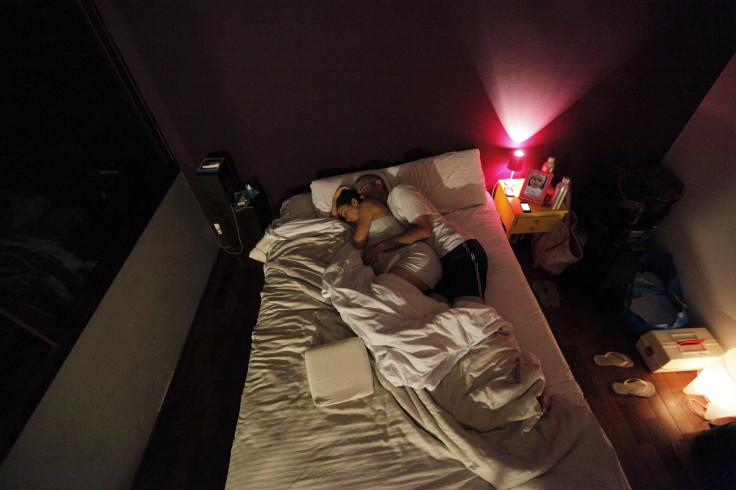Sexual Activities Among Americans Declined Due To Helicopter Parenting

Sex appears to be available more easily than ever before, with numerous dating apps cropping up every day and allowing people to schedule their next hook-ups with just a swipe on their phones. Then there are the committed couples who are assured of a "sure thing" every night, which is also known as "the marriage advantage."
Despite the ease of accessibility, why are American adults having less sex compared to what they were having around 20 years ago?
A paper published in the journal Archives of Sexual Behavior in March this year found that American adults are having less sex than they did a couple of decades ago. Analysis of data from 1989 to 2014 also showed that frequency of sex among married people saw a drastic decline when compared to unmarried couples or single adults.
The paper showed an overall drop in sexual activity across race, gender, region, work status and education level.
Read: When Sex Is Good: Men Can Feel More Spiritual After Intercourse, Study Says
The paper used data from the national general social survey (GSS) between the years 1989-2014, and discovered that adults on an average had sex about nine fewer times per year in the early 2010s compared to what they did in the late 1990s.
The paper suggested that this decline was not related to extended work hours or the rise in the use of pornography.
"A lot of parents feel like they've already done about 50 things they didn't want to do that day, like getting up at dawn, dealing with their child's tantrums. Adding sex to the menu just seems like too much," said psychologist Samantha Lutz, according to CNN.
"So we turn to things like Netflix to unwind, which leads to immediate gratification with zero energy expended," Lutz added.
Amanda Pasciucco, a licensed marriage and family therapist, told CNN that another reason might be that parents were involved with their children and their every day activities more than before, which led to less free time for themselves. "Parents are constantly driving their children to school and extracurricular activities," Pasciucco said.
Eric Marlowe Garrison, a certified sexuality counselor, agreed with Pasciucco’s opinion, saying, "We're seeing more helicopter parenting, which is zapping energy that could go toward sex and other sensual activities."
Read: Teens Choosing Oral Sex Over Intercourse Thinking It’s Safer, CDC Reports
The term "helicopter parent" refers to a parent who would like to monitor their child’s behavior in every possible aspect of their lives including playtime and schoolwork, and is usually done to gratify or counter the parent’s fear of failure or harm their children might go through. The term was coined in 1990 by child development researchers Foster Cline and Jim Fay.
Parents tend to give in to these concerns and thus end up replacing personal time with parenting time, the data analyzed in the new paper suggested.
The paper also suggested other possible factors for the decline in sexual activity. It said decline in happiness among people aged 30 or more might lead to such a consequence; another factor cited was the higher incidence of depression; use of antidepressants was also related to sexual dysfunctions, the paper said.
“Are they less happy and thus having less sex, or are they having less sex and therefore less happy? It’s probably some of both,” said Jean M. Twenge, the paper’s lead author and psychology teacher at San Diego State University.
“We do know that sexual frequency is linked to marital satisfaction, so overall if you have fewer people having sex, you could have people who are less happy and less satisfied with that relationship,” Twenge, who wrote “Generation Me,” a book about millennials, told the Washington Post.
Several psychotherapists and sex therapists also claimed that technology might act as a barrier among married or committed couples when it came to sexual activity.
Whether they're at dinner or walking their dog, I see more and more couples looking at their respective phones while they're together," Marty Klein, author and certified sex therapist, told CNN.
"This reduced conversation and attention for each other can't be good, as it reduces the 'simmering' feeling that so many people want as the context for sex," Klein noted.
Deborah Fox, a psychotherapist, added: "Many couples find themselves in bed looking at their devices, freely admitting that they're doing nothing all that compelling. They've allowed themselves to drift into habits that disconnect them. If sex has become boring for these couples, it's because they've allowed the drift to dampen their creativity, not because that YouTube video is so much more exciting."
However, this might not be the case for single adults. According to Pasciucco, millenials who are single might become victims to the technology of dating apps,and this might reduce the urge or likelihood of having sex too.
"In the age of Tinder, people are having more cybersex," Pasciucco explained.
"Sexting and sending photos is rampant," she said, "and I have heard more and more people reporting to me that they send nude photos to people they've never met - and never intend to meet!"
© Copyright IBTimes 2024. All rights reserved.






















